- Accueil
- Entretenir sa malle
- Estimation
- Lexique
- Décoration
- Personnalisation
- Etiquette Hotel
- Blog
- Malle ancienne
- Louis Vuitton
- Modeles
- Toiles
- Serrures
- Lozines
- Etiquettes
- Séries
- Expertise
- Prix du neuf
- Record enchère
- Stars LV
- Contrefaçon
- Nouveauté 2025
- Vanity
- Valise
- Cabine
- Courrier
- Wardrobe
- Automobile
- Fourrure
- Chaussures
- Ideale
- Aluminium
- Explorateur
- Malle à fleurs
- Cadeau VIP
- Jouets
- Chapeau
- Leopold Stokowski
- Albert Kahn
- Tableau
- Lit
- Tiroirs
- Bibliotheque
- Aéro
- Cigare
- Pique-nique
- Alcool
- Pêche
- Marmotte
- Steamer Bag
- Vermeer
- Vendôme
- Georges Vuitton
- Gaston Vuitton
- Homme cible
- Sac petite malle
- Goyard
- Moynat
- Hermès
- Contact
- Ateliers
- Tutoriel : Fabriquer sa malle
- Boutique
LOUIS VUITTON OLD TRUNK LOCK°
LOUIS VUITTON LOCK MODEL BETWEEN 1854 AND 2019
Article dedicated to old trunk locks, Louis Vuitton. We try to reference the main ones.
There are dozens of different models we present to you the most common.
VOCABULARY
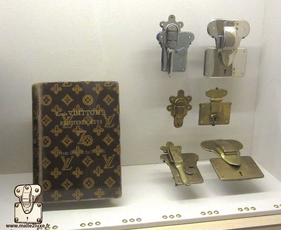
There are 3 types of safety technology for trunks:
- Garniture (door) Lock
- Variure lock
- Gorge (throat) lock
Definition - lock:
Strictly speaking, a lock is not used to "close" a trunk or a suitcase, which is the role of "clasps".
The purpose of a lock is to give the owner of the object a security on its contents by a more or less sophisticated connection.
General description :
A lock is made up of two distinct parts fixed, one on the cover and called a " hasp ", the other on the shaft and comprising the " palâtre " on the outside and the " mechanism box " on the inside .
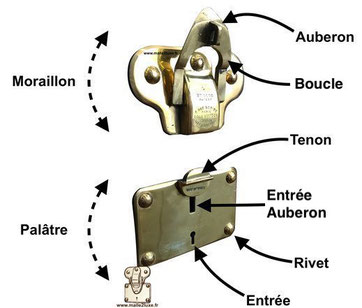
Hasp : Upper part of a lock, usually attached to the front of the lid of a trunk, suitcase, box, etc. And the articulated part of which is folded back on the palâtre is provided with an inn which receives the bolt.
Hasp buckle : Movable metal part of flat or semicircular shape, joins the hasp to the lock plunger.
Auberon (or Aubron): Small metal part in the form of a trigger guard fixed to the underside of the hasp loop, which passes through the palâtre and in which the lock bolt engages, it is a form of keeper.
Palâtre : Lower part of a lock. Metal plate usually attached to the barrel of a trunk. At the back of it is fixed the lock mechanism. It can be fitted with a tenon.
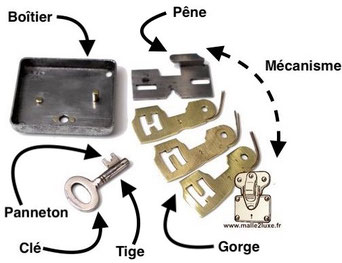
Tenon : Metal accessory attached to the lock's pallet, intended to guide and maintain the interlocking of the hasp to the lock.
Lock box : Metal part of the lock fixed to the palâtre and containing the lock mechanism.
Groove : Metal parts mounted on a pivot, raised to a certain height by the rotation of the key bit of the key.
Key : Metal part used to open or close a lock.
Key shank : Which can be solid or drilled to be threaded on the axis of the lock.
Panneton : End of the key of various shapes which penetrates into the lock and activates the bolt of the lock. Its pattern, cut to match the keyhole and the fittings, or grooves of the lock.
FINISHES - COLOR
The lock is available in several finishes depending on the period:

Solid steel
Glossy lacquered - black
Mirror polished copper - red
Solid brass
Mirror polish - yellow
Mirror polished nickel - silver
Solid aluminum
Mirror polished - white
KEYED LOCK
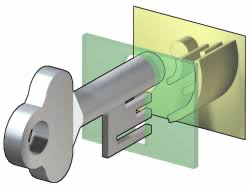
Definition - keyed lock:
The lock with fittings was developed around -750 BC (ancient Rome), then improved around 500 AD (Middle Ages).
The lock works thanks to fixed metal parts (the fittings), the arrangement of which must correspond to the pattern of the key bit so that it can turn.
The keylock is inexpensive and sturdy, but it can be easily picked. A master key makes it easy to open the locks operating on this principle. In practice, they only resist a few seconds to a trained and equipped criminal.
Padlock circa 1901 for steamer bag :





VARIURE LOCK

Definition - variable lock:
It is an improvement of the lock with fittings, in which the entry axis is profiled so as to accept only the keys provided with a bit of the corresponding profile. This variant is also called a number lock, because the profile of the keyhole (the variure) sometimes suggests a number, although there are many other shapes. The entry profile does not interfere with the use of a hook, and a thief opens this type of lock just as easily as a conventional lock.
On the first Louis Vuitton trunks around 1860, which was domed and covered with Trianon canvas, the locks were in black lacquered white tin.
Later, on high-end flat trunks, the locks will be made of brass. Most first generation brass locks were polished brushed vertically. The design will evolve.

The auberon is most often cold riveted steel.
The first will not be signed or patented.
The end of the rod is drilled in its center.









CENTRAL LOCK

While the first models of trunk were protected by two locks , reinforced by a strong leather strap.
In 1886, Louis and Georges perfected the trunk closure system and made important modifications to all the Maison's products by adopting a single central lock with two clasps on either side.
LOUIS VUITTON THROAT LOCK

Definition: throat lock
A groove lock is a lock fitted with metal parts mounted on a pivot, raised to a certain height by the rotation of the key bit.
This is the first real improvement to the keyhole lock. Indeed, it is necessary that all the grooves are simultaneously lifted to release the bolt. The level of security of such a lock is measured by the number of its grooves: from 2 for the most basic, from 3 to 6 for the most elaborate.
LOCK WITH 2 GROOVES - ANTI-RETURN 1888
Appeared in the years 1888 , the anti-return lock is aesthetic, flat, with a system of 2 grooves , it is reserved for the brand's high-end models. For the first time, the hasp is engraved with the addresses of the shops.

Unfortunately, it has one drawback: you don't need the key to close it, but once it's in, you can't open it. Like an apartment door slamming, leaving us blocked outside. Hence the name " anti-return lock ".
For this reason, 90% of the trunks with this lock have been forced open.
Engraving the locks :
Moraillon: 1 rue du scribe Paris
Louis Vuitton
289 Oxford Street London
or 454, Strand London (depending on year of production)
Palâtre: Lock number





3 GROOVE GROOVE LOCK - 1889

Travelers take essential items, important papers, banknotes and jewelry in their trunks.
So many personal effects entrusted to unknown hands throughout their journey make their owners anxious not to be sure of always remaining master of the sesame, opening and closing access to their secrets and their treasures.
To reassure its wealthy travelers, Louis Vuitton wanted to offer them the greatest security, making their trunks a sanctuary, a veritable safe.

It was not until September 10, 1889, for Georges Vuitton to develop, with the help of two craftsmen, Mr. Foucher and Mr. Delachanal, a 3-groove lock mechanism that he would patent.
Each brass clockwork groove is numbered and randomly assembled to form a tamper-evident lock mechanism.
This new closing process is a revolution for the time for a trunk. It still forms the basis of the multigorge locks used today for rigid luggage.
It represents a second advantage. Whereas before, each lock number was unique, Louis Vuitton imagines an individualized serial number inscribed on each lock and equivalent on all the locks of the same buyer.

The latter has exclusive ownership of a unique key capable of opening all his Louis Vuitton luggage. And this for his present and future luggage.
The true privilege of the cosmopolitan traveler.
Georges filed the patent for this revolutionary "hook-on" system, as indicated on the locks themselves.
There are then 2 sizes of locks using the same mechanism.
Large lock engraving :
Hasp: SGDG PATENT patent
1 rue du scribe Paris
Louis Vuitton
454, Strand London

Palâtre: Made in France
Lock number
Small engraving :
Hasp: SGDG PATENT patent
Louis Vuitton
454, Strand London
Palâtre: Made in France
1 rue du scribe Paris
454, Strand London
Lock number
4-GROOVE LOCK - 1890
During the year 1890, less than a year after its creation, the registered throat lock evolves and they add a throat.
5-GROOVE LOCK - 1900
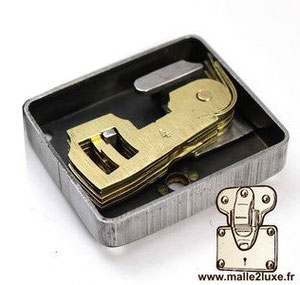
Around 1900, George Vuitton changed his groove lock by adding an additional groove, i.e. 5 grooves instead of 4.
Its lock helped increase the reputation of the luxury house. Its design is recognizable by all.
Mechanism :
The chest thickens with an additional groove.
Engraving :
New London store address: 149 New bond St London

















DOUBLE PUSH LOCK - 1910
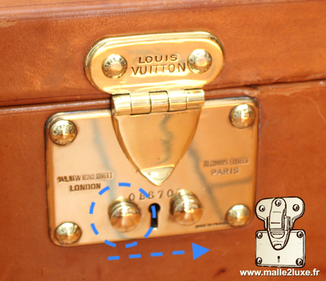
At the beginning of 1910 , the trunk maker invented the double push-button lock.
Dedicated to hand boxes and small suitcases and offering a quick opening, enough to satisfy elegant travelers who, with a simple press on the two push buttons, open their luggage without damaging their nails. This system is operated by a spring and the hasp remains in the open position.
The right pusher is fixed and serves as a support. Only the left pusher translates.
Mechanism:
The safe is derived from the 5-groove locks.
Engraving :
Hasp: Louis Vuitton
Palâtre: 149 New bond St. London - 70 Champs Elysées Paris - Made in France





NEW GENERATION LOCK - 1931

From 1931, a new generation of Louis Vuitton locks fitted the luggage of the luxury house. There are now:
4 sizes of groove locks , including one with double push button.
The entry of the locks is replaced by a removable cylinder (barrel) on which is engraved the number of the lock.

Mechanism :
The key will be smaller and made of brass.
Although the 5-groove technology remains the same, the grooved combination system is completely overhauled.
Design :
The hasp loop will be redesigned sharper to make it easier to grip and open.
Engraving :
Hasp: The LV logo made its appearance.
Palâtre: Louis Vuitton - Made in France








LOUIS VUITTON 6-BOLT LOCK
Around 1990, no aesthetic change just the addition of an additional groove.
Mechanism :
The key bit does not change, so they will add an additional groove in the same length (corresponding to the trunk depth). The grooves will therefore be smaller, going from 1.2 mm to 1 mm.





SPECIAL CASES :
LOCK WITHOUT LOUIS VUITTON INSCRIPTION
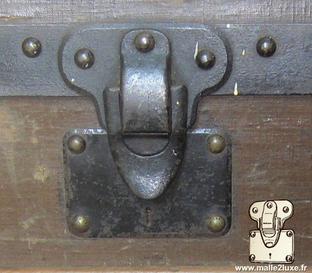
The lock with fittings will not be completely abandoned; it will be kept for a few special cases, including the black lacquered steel lock , for 4th, 5th and 6th series trunks (low-end finish).
These locks will then be without registration or shop address on the hasp and on the palâtre. The trim mechanism is riveted to the palâtre and not screwed.
This lock will be abandoned in the 1915s.






LOUIS VUITTON LETTER AND STAR LOCK

The keyed lock will be used for a few special cases including letter and star locks , mainly used for automobile trunks. The numbering of the locks is a letter and not a number.
ABCDYZ being the most common.
Unlike the steel lock, the letter lock is made of brass with the patent inscriptions. Only the mechanism will change, the exterior being the same.
Automobile trunk: automobile trunk locks are equipped with a dust cover and do not contain the addresses of the shops. The engraving is then on the dust cover.












LOUIS VUITTON TRUNK KEY PATENTED GROOVE LOCK

The key is often lost, so it is common to have an old trunk without its keys.
A trunk is a real safe, despite the promises of invulnerability of this mythical so-called unpickable lock, thanks to the unique lock number we determine the shape of the key ** and are able to manufacture it *, whatever your Louis trunks Vuitton over its last 138 years.
Buy a letter key for your Vuitton trunk from our online store
*The key is made to measure for patented groove locks, neither taken back nor exchanged.
**We do not guarantee that your mechanism is in working order. Indeed the interior mechanism especially on the old trunks can be seized, rusted, broken, and therefore out of use...
*** For all other requests contact us
SINGLE PUSH LOCK
Single push locks do not have the Louis Vuitton patented throat system, which is exclusively for suitcases and car cases.













OLD FLOWER TRUNK LOCK
Miniature lock for flower trunk . Several versions exist.





MINI LOCK AND OTHER MODEL
Mini push lock for Louis Vuitton mini suitcase and box
Keyless push lock designed for Louis Vuitton bags and small boxes




OTHER LOUIS VUITTON LOCKING SYSTEMS
Other lock models of different kinds and systems.













READ ALSO:

Conservation - Restoration of old trunk for or against?
It's a conversation that we have several times a week with novices or amateurs on the importance of restoring a trunk or not. Here are a few ways to become fully aware of a subject that is rarely discussed. This article will help you see it more clearly. Read more...
Serrure Louis Vuitton : French page
Copyright © 2008-2025 Malle2luxe Paris. Tous droits réservés.

